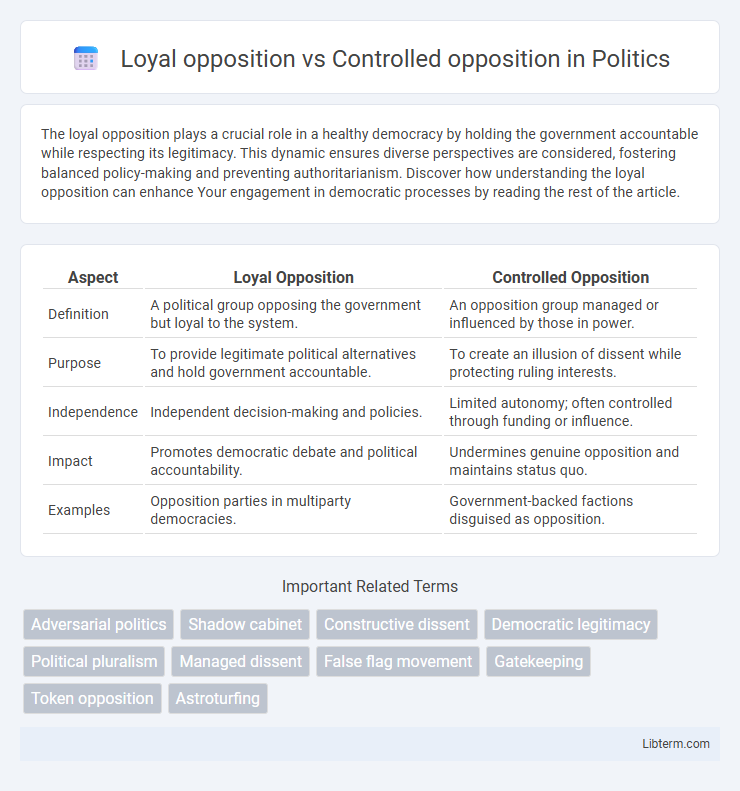The loyal opposition plays a crucial role in a healthy democracy by holding the government accountable while respecting its legitimacy. This dynamic ensures diverse perspectives are considered, fostering balanced policy-making and preventing authoritarianism. Discover how understanding the loyal opposition can enhance Your engagement in democratic processes by reading the rest of the article.
Table of Comparison
| Aspect | Loyal Opposition | Controlled Opposition |
|---|---|---|
| Definition | A political group opposing the government but loyal to the system. | An opposition group managed or influenced by those in power. |
| Purpose | To provide legitimate political alternatives and hold government accountable. | To create an illusion of dissent while protecting ruling interests. |
| Independence | Independent decision-making and policies. | Limited autonomy; often controlled through funding or influence. |
| Impact | Promotes democratic debate and political accountability. | Undermines genuine opposition and maintains status quo. |
| Examples | Opposition parties in multiparty democracies. | Government-backed factions disguised as opposition. |
Understanding Loyal Opposition: Definition and Purpose
Loyal opposition refers to a political party or group that opposes the current government while remaining loyal to the broader system or constitution, aiming to hold power accountable through legitimate and constructive criticism. Its purpose is to provide alternative policies, challenge the ruling party's decisions, and represent diverse public interests without undermining the democratic framework. Understanding loyal opposition involves recognizing its role in strengthening democracy by ensuring government transparency and responding to citizens' needs through lawful dissent.
What is Controlled Opposition? Key Characteristics
Controlled opposition refers to individuals or groups that appear to challenge an established authority but are actually created, managed, or manipulated by that same authority to mislead and neutralize genuine dissent. Key characteristics include the promotion of moderate or non-threatening criticism, diversion of activist energy away from impactful change, and the dissemination of propaganda that aligns subtly with the interests of the controlling power. These entities often gain legitimacy through media exposure or public platforms while undermining authentic opposition by sowing confusion and mistrust.
Historical Roots of Loyal Opposition
The concept of Loyal Opposition originates from the British parliamentary system in the 18th century, where opposition parties recognized the legitimacy of the reigning government while challenging policies through formal debate. Historically, Loyal Opposition serves as a constructive force to hold those in power accountable without undermining the state's stability or sovereignty. This practice established a precedent for democratic governance, distinguishing genuine dissent from controlled opposition, which often functions as a covert mechanism to neutralize or manipulate political resistance.
Tactics and Strategies of Controlled Opposition
Controlled opposition employs tactics such as infiltration, misinformation, and co-optation to manipulate dissent and maintain existing power structures. Strategies include discrediting genuine activists by association, diverting public attention from critical issues, and promoting superficial reforms that reduce momentum for real change. By creating a false appearance of resistance, controlled opposition undermines trust within movements and neutralizes threats to authority.
The Role of Loyal Opposition in Democracy
The loyal opposition plays a crucial role in democracy by providing constructive criticism and holding the government accountable while respecting the constitutional framework. It ensures a healthy political balance by opposing policies without seeking to undermine the legitimacy of the ruling authority. This responsible dissent fosters transparency, encourages dialogue, and strengthens democratic institutions by preventing the consolidation of unchecked power.
Identifying Signs of Controlled Opposition
Controlled opposition often exhibits signs such as consistent promotion of narratives that subtly support existing power structures while appearing to challenge them. Key indicators include repeated alignment with establishment talking points, lack of significant policy alternatives, and suppression or dismissal of genuinely radical views within the movement. Observing communication patterns that emphasize division among dissenters or discourage grassroots mobilization can also signal controlled opposition efforts.
Impact on Political Discourse: Loyal vs Controlled
Loyal opposition plays a crucial role in maintaining democratic integrity by providing genuine dissent and holding the ruling party accountable, fostering a healthy political discourse. Controlled opposition, often manipulated by those in power, disrupts authentic debate by misleading voters and diluting meaningful dissent, leading to political apathy and mistrust. The distinction between loyal and controlled opposition significantly impacts the quality of political dialogue and the public's ability to engage in informed decision-making.
Case Studies: Examples of Loyal and Controlled Opposition
The Democratic Party in the United States often serves as a case study of loyal opposition by opposing Republican policies within the accepted political framework, promoting reforms without challenging the system's foundations. In contrast, the apartheid-era South African Communist Party is frequently cited as controlled opposition, as it was alleged to be manipulated by the government to pacify dissent while maintaining the apartheid regime. These examples highlight how loyal opposition operates with genuine intent to influence change, whereas controlled opposition functions primarily to undermine or co-opt resistance movements.
Dangers of Controlled Opposition to Public Trust
Controlled opposition poses significant dangers to public trust by deliberately misleading citizens through covert manipulation, undermining authentic dissent and fostering cynicism. This strategic deception weakens democratic processes and accountability by creating a facade of disagreement while maintaining existing power structures. When the public discovers such manipulation, confidence in political institutions erodes, leading to increased apathy and disengagement from civic participation.
Promoting Genuine Opposition for Healthy Societies
Promoting genuine opposition ensures vibrant democratic discourse by encouraging diverse viewpoints that challenge authority and drive social progress. Loyal opposition represents authentic dissent functioning within a political system, whereas controlled opposition is often manipulated to create an illusion of debate while suppressing real change. Supporting genuine opposition fosters accountability, transparency, and the protection of civil liberties essential for healthy societies.
Loyal opposition Infographic

 libterm.com
libterm.com